#no moral ones
Text
Even if we take thrawn's claim that he's trying to protect his people at face value (personally I don't buy it, the so called "threat" of the grysk seems really exaggerated, I'll bet that thrawn's either playing up how dangerous they are and/or they're simply a local threat, dangerous to a regional power like the chiss sure, but to the whole galaxy? No), that does not make him a good person doing bad things for a good reason, morally grey, etc etc whatever
Because it doesn't matter
His alleged care (which never pops up in real canon) has lead him to support the empire, to keep it alive, to make it work
One way or another, thrawn is responsible (he's a grand admiral for crying out loud, he's pretty high up) for the atrocities the empire committed
How many billions were oppressed, suffered, and died under the empire because thrawn helped it?
I'll bet it's many more people than there are chiss
And that's a thing SW has always been clear about, sacrificing many to save a few is wrong, its bad, it's selfish, it is the dark side
Maybe thrawn had good intentions ("had" being the operative word there), but we know what road is paved with those
#and don't throw a “thrawn opposed the death star!” at me#he opposed it for personal reasons#no moral ones#he had no ethical qualms with planet killing weapons#he was against it because it ate up resources for HIS personal project#a project that would have made the empire stronger and better able to oppress people#thrawn is a willing supporter of the empire#wooloo-writes#wooloo writes#star wars#sw#thrawn#thrawn critical#anti thrawn#dunking on the blue bastard#thrawn is a fascist
19 notes
·
View notes
Text
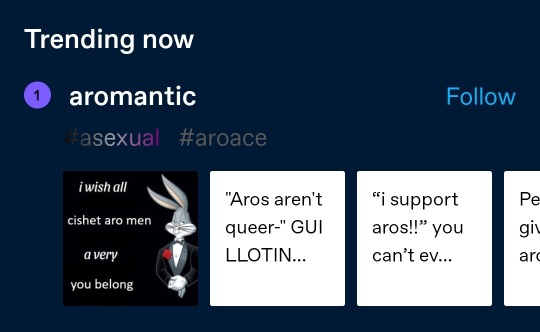

ALT
#aromantic#actually aromantic#aro#aro pride#love loses#good job everyone. im so proud of us <2#edit (12/31): also pls do not quote 'not all loves are romantic/sexual' at me#1. aros have always been the first to dissect the definition of love. we are likely to know that before you.#2. are we gonna keep pretending that aros aint only an afterthought to the 'love wins' and 'love is love' crowds.#3. im loveless aro. i do not care for love whether its romantic platonic or familial etc etc.#one can do good w love. one can also do evil w love. love =/= morals. stop acting like it is.
19K notes
·
View notes
Text
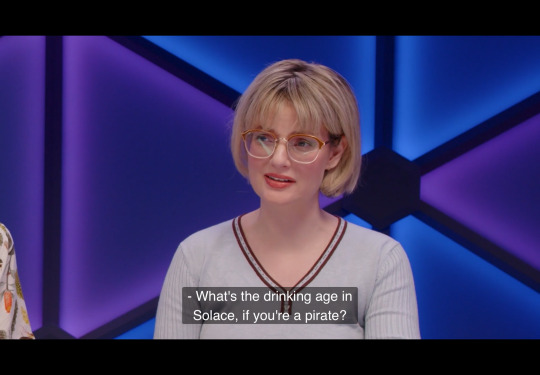

#their absolutely fucked moral code is absolutely one of the best parts of the show#dimension 20#fantasy high#fhjy#fhjy spoilers
11K notes
·
View notes
Photo
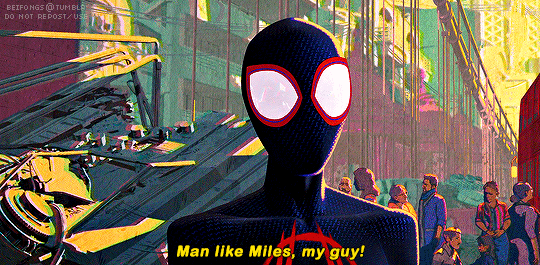

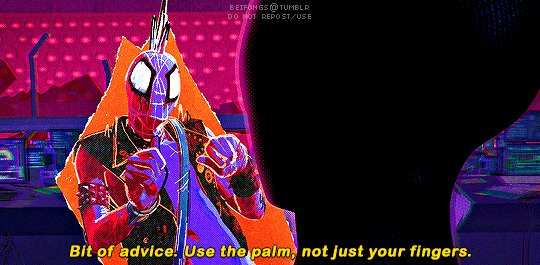
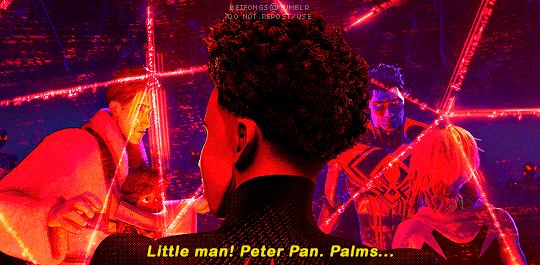
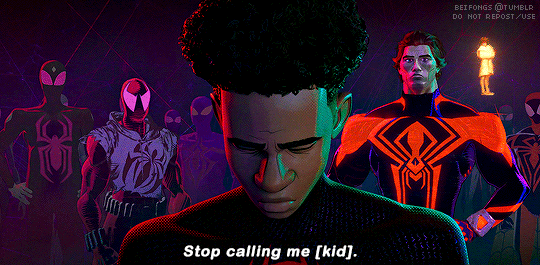
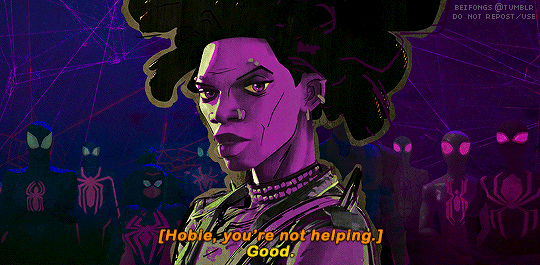
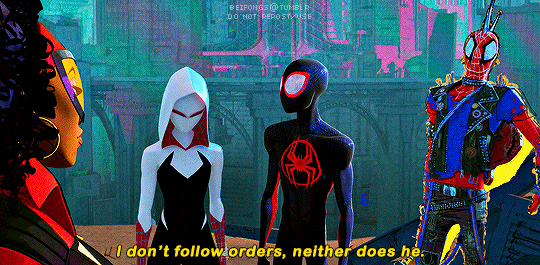
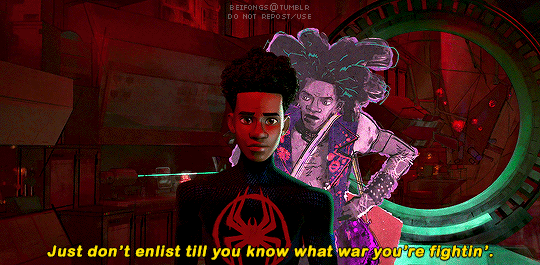

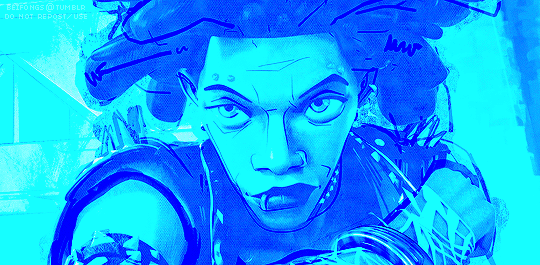
Hobie being Miles' #1 supporter, hype man & homie 👊🏿
#Spiderman: Across the Spiderverse#Across the Spiderverse#marveledit#animationedit#Hobie Brown#Spider Punk#Miles Morales#Spiderman#atsvedit#ATSV#*mine#Hobie rhymes with Homie because he's a real one!!!#he been lookin' out for Miles from the moment they met 🥺#and the way he hopped towards Miles in the first gif!!!!!#HOW CAN SOMEONE BE BOTH THIS COOL AND SO CUTE AT THE SAME TIME UGH
25K notes
·
View notes
Text
Have we talked about the Miguel Burger yet?

I just wanna know if it was his idea, if he authorized it, or do the other spiders just think it’s rlly fucking funny and do it to annoy the guy?
I need to know WHY
#ITS KINDA CUTE#the Miguel meal#O’Hara patty?#the 99 burger#2099 burger.?#miguel o'hara#across the spiderverse#spiderverse spoilers#into the spiderverse#this was during the miles chase scene with all the other spiders#miguel ohara#probably a call back to the miles morales Burger King red bun thing#I’d love to see a punk Hobie brown one#with little SPIKES#if Gwen got one it’d probably look moldy 😭#pavs would also b cute#ATSV#ITSV
27K notes
·
View notes
Text
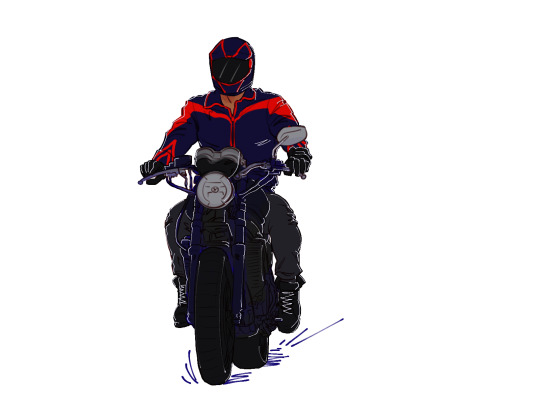
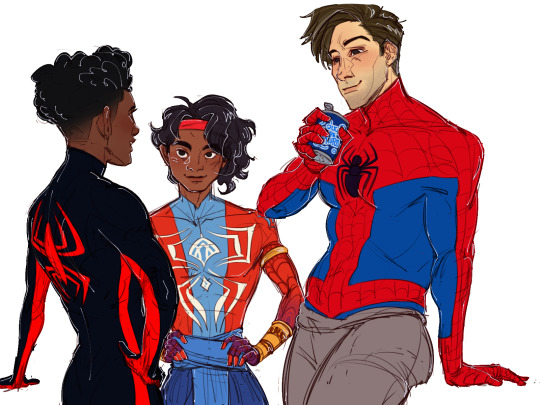

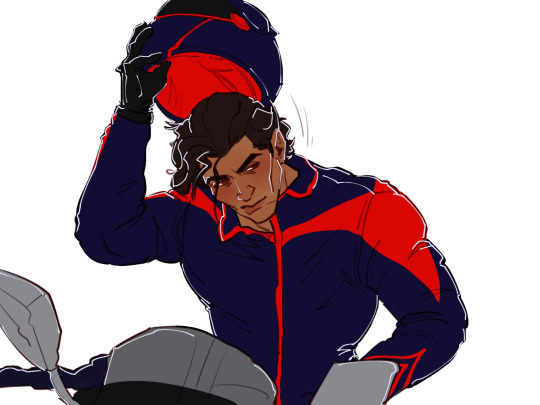

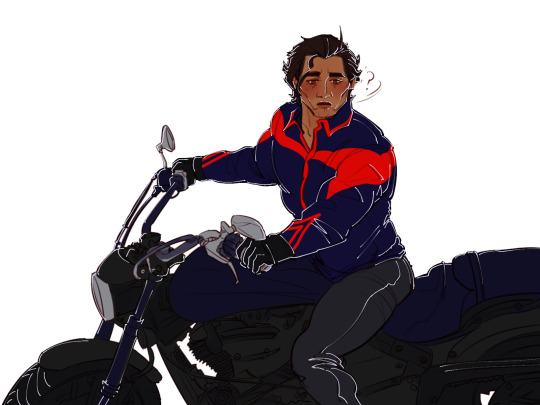
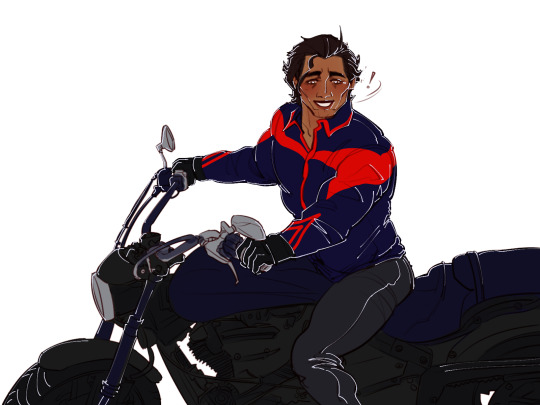
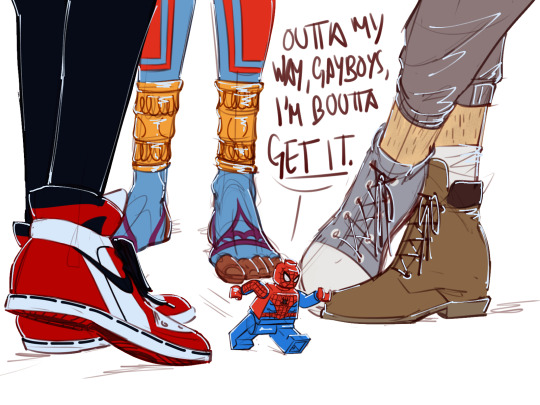
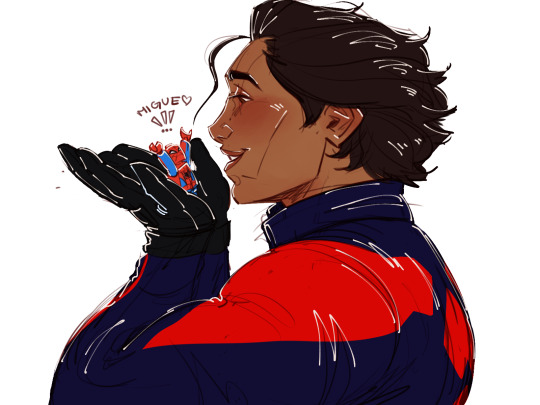

Part 2 in the reblogs 💖
#astv#now imagine this to the sound of Torero by Chayanne#across the spiderverse#across the spider verse fanart#atsv fanart#miguel o hara#miguel o'hara#peter benjamin parker#peter b parker#miles morales#pavitr prabhakar#lego spiderman#uhhh#spiderverse fanart#fanart#my art#is there a tag for this ship? there must be#im kinda too lazy to look it up rn#im still sleepy#also this is part one so part two coming right up#lego99
20K notes
·
View notes
Text

they’re in my home ruining everythig
#one day i’ll draw the other atsv characters. just not today and also maybe tomorrow#miles morales#meows morales#prowler#across the spiderverse#spiderman across the spiderverse#my art#atsv
12K notes
·
View notes
Text

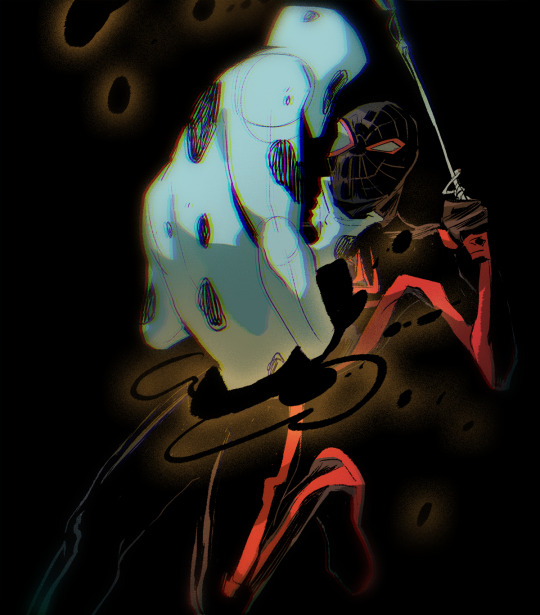
i created you and you created me
#the spot#miles morales#spider-man#across the spider-verse#spider-verse#marvel#meruzart#comics#i love spot ive loved spot ever since he got fucked up in that one waid daredevil art LOL
16K notes
·
View notes
Text
btw. your search for the most morally upright and ethical piece of media that has the most correct “representation” will destroy your ability to find the most profound and beautiful and human of stories. and may even destroy the stories themselves before they are created. if you even care.
#the search for the Ideal Representation is both unattainable and soul-crushing. childrens cartoons moral codes are not#the best way to judge a piece of media#and the stories created by the very people in the communities that are most silenced are always the first ones to be#targeted for their Problematic Factors#as if any story can properly encapsulate the breadth of every complex human experience in one go#something isn't inherently deserving of being reduced to Irredeemable Media status just because you cannot personally relate to it#on the other hand approaching every single story as if its only value is its Shipping Status and how you can#incorporate it into your identity (and stake your Moral Uprightness based on how Ethically you consume said media)#is not necessarily any better. but different post is needed.#aughhhh bite bite chomp kill
43K notes
·
View notes
Text
your average 1830 classicist be like:

#we all have that one cousin#and if we don’t it’s bc we are the romantic cousin#no context#romaticizm(tm)#the anti romantic moral panics still wreaking havoc in the world’s population psyches i see u_u
5K notes
·
View notes
Text
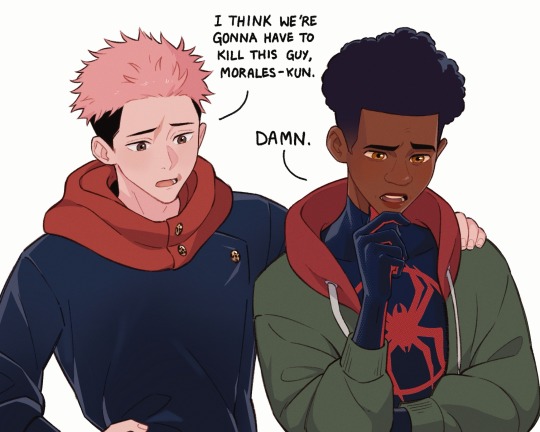
Red riding hood boys
#jujutsu kaisen#jjk#jjk fanart#jujutsu kaisen fanart#across the spiderverse#atsv#miles morales#itadori yuuji#crossover#morales-kun was a one-off decision but it seems to be making a quite an impression :D
4K notes
·
View notes
Text

SPIDERVERSE INSTAGRAM POSTED BABY MILES IM GONNA SCREAM
#me at my partner: I want one#miles morales#spider man#spider-man#spiderverse#into the spider verse#across the spiderverse#spiderverse film#atsv#itsv
3K notes
·
View notes
Text
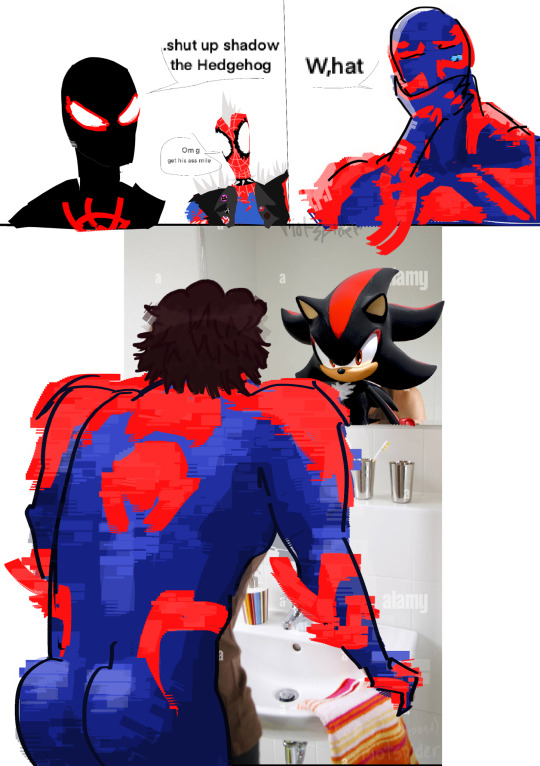
This took me 2 hours to make i almost passed outn2 tikmes I’m so tirfed
edit: do not repost my art to a different site/platform/app. if sharing on discord/etc, just directly linkback to the post. thank u! oc redraws are fine, just credit me!! and tag me in those id like to see lol
#was it worth it#I don’t. Know#atsv#spiderverse#spiderman#across the spiderverse#what REALLY happened#miguel o'hara#shadow the hedgehog#LIKE DID ANYBODY SEE THE CONNECTIONS?? LITERALLY NO DIFFERENCE BWTEEN THEM..#I’d be so fucking surprised if I was the first one to. Instantly notice that#riotspider art#miles morales#hobie brown#spider punk#atsv fanart#atsv miguel#atsv hobie#atsv miles#edit; damn this hitting numbers.. ty for 14 likes 😊#edit; wwait wtf what the fuck why is there 11.7k notes
12K notes
·
View notes
Text

Putting him in a blender
#crowcraft#across the spiderverse spoilers#spiderverse#atsv#atsv spoilers#miles morales#uh kinda#the prowler#prowler miles#atsv prowler#new fandom new tags#I have so. So SO many canvasses full of him and 1610 miles it’s insane#drawing low quality stuff but no time to post :(#exams are nearly over though! reallllllly looking forward to a break#got one more to freak out over then I’m DONE#woah the quality on this one is proper fucked
9K notes
·
View notes
Text
i don’t know what’s funnier: spidernoir and spider-ham being invited to the spider society and them turning it down, or just straight up not being invited to join lmao
#i was wondering where they were especially after i saw peni#it was good to see them at the end of the movie tho#they better have speaking parts in the next one#the gangs all back together#thanks gwen#spiderman across the spiderverse#spiderman#across the spiderverse#across the spider verse spoilers#atsv spoilers#atsv#spiderman atsv#spider noir#spider ham#peter benjamin parker#peter porker#miles morales#marvel
11K notes
·
View notes
Text
"The idea of reforming Omelas is a pleasant idea, to be sure, but it is one that Le Guin herself specifically tells us is not an option. No reform of Omelas is possible — at least, not without destroying Omelas itself:
If the child were brought up into the sunlight out of that vile place, if it were cleaned and fed and comforted, that would be a good thing, indeed; but if it were done, in that day and hour all the prosperity and beauty and delight of Omelas would wither and be destroyed. Those are the terms.
'Those are the terms', indeed. Le Guin’s original story is careful to cast the underlying evil of Omelas as un-addressable — not, as some have suggested, to 'cheat' or create a false dilemma, but as an intentionally insurmountable challenge to the reader. The premise of Omelas feels unfair because it is meant to be unfair. Instead of racing to find a clever solution ('Free the child! Replace it with a robot! Have everyone suffer a little bit instead of one person all at once!'), the reader is forced to consider how they might cope with moral injustice that is so foundational to their very way of life that it cannot be undone. Confronted with the choice to give up your entire way of life or allow someone else to suffer, what do you do? Do you stay and enjoy the fruits of their pain? Or do you reject this devil’s compromise at your own expense, even knowing that it may not even help? And through implication, we are then forced to consider whether we are — at this very moment! — already in exactly this situation. At what cost does our happiness come? And, even more significantly, at whose expense? And what, in fact, can be done? Can anything?
This is the essential and agonizing question that Le Guin poses, and we avoid it at our peril. It’s easy, but thoroughly besides the point, to say — as the narrator of 'The Ones Who Don’t Walk Away' does — that you would simply keep the nice things about Omelas, and work to address the bad. You might as well say that you would solve the trolley problem by putting rockets on the trolley and having it jump over the people tied to the tracks. Le Guin’s challenge is one that can only be resolved by introspection, because the challenge is one levied against the discomforting awareness of our own complicity; to 'reject the premise' is to reject this (all too real) discomfort in favor of empty wish fulfillment. A happy fairytale about the nobility of our imagined efforts against a hypothetical evil profits no one but ourselves (and I would argue that in the long run it robs us as well).
But in addition to being morally evasive, treating Omelas as a puzzle to be solved (or as a piece of straightforward didactic moralism) also flattens the depth of the original story. We are not really meant to understand Le Guin’s 'walking away' as a literal abandonment of a problem, nor as a self-satisfied 'Sounds bad, but I’m outta here', the way Vivier’s response piece or others of its ilk do; rather, it is framed as a rejection of complacency. This is why those who leave are shown not as triumphant heroes, but as harried and desperate fools; hopeless, troubled souls setting forth on a journey that may well be doomed from the start — because isn’t that the fate of most people who set out to fight the injustices they see, and that they cannot help but see once they have been made aware of it? The story is a metaphor, not a math problem, and 'walking away' might just as easily encompass any form of sincere and fully committed struggle against injustice: a lonely, often thankless journey, yet one which is no less essential for its difficulty."
- Kurt Schiller, from "Omelas, Je T'aime." Blood Knife, 8 July 2022.
#kurt schiller#ursula k. le guin#quote#quotations#the ones who walk away from omelas#trolley problem#activism#introspection#discomfort#reform#revolution#suffering#ethics#morality
10K notes
·
View notes